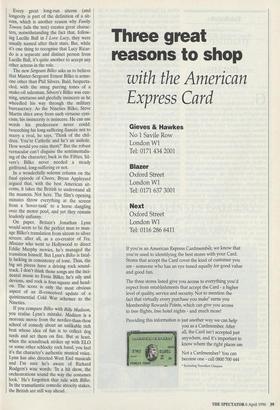Cinema
Sergeant Bilko (PG, selected cinemas) Billy Madison (PG, selected cinemas)
Dead ironic society
Mark Steyn
Iwas interested to read, in James Deling- pole's television column, of his concern for the fate of British sitcoms in America. So perhaps I can reassure him: the American adaptation of Absolutely Fabulous has been cancelled before it's even hit the screen, as indeed was the Americanised Fawlty Tow- ers. As for Alf Garnett being 'turned into the non-racist Archie Bunker', just for the record, Archie Bunker routinely referred to blacks as 'coons', 'jungle bunnies', etc., and, in one of the most famous episodes, tried to explain his racism to Sammy Davis Jnr, who responded by kissing him smack on the lips.
As I write, James Delingpole is not, alas, to hand, so I'm unable to respond to his Americophobia in the same manner by giv- ing him a massive tongue sarnie. But to his credit, he didn't fall back on that old saw about Americans having no sense of irony, as Nigel Havers did recently on Channel 4. It's certainly true that, from its ironic monarchy and ironic Prime Minister down, Britain is well on its way to becoming the first wholly ironic society.
But, for what it's worth, I happen to agree with the US networks: Absolutely Fabulous is an extended variety sketch; without Joanna Lumley and Jennifer Saun- ders, there's nothing there. The same is true of Fawlty Towers, which is why John Cleese was wise to call it quits after only a handful of episodes. When I see it now, I like Prunella Scales and Connie Booth, but I find Cleese coarse and unwatchable; there's no character; it's a vaudeville turn. Every great long-run sitcom (and longevity is part of the definition of a sit- com, which is another reason why Fawlty Towers fails the test) creates great charac- ters, notwithstanding the fact that, follow- ing Lucille Ball in I Love Lucy, they were usually named after their stars. But, while it's one thing to recognise that Lucy Ricar- do is a separate and distinct person from Lucille Ball, it's quite another to accept any other actress in the role.
The new Sergeant Bilko asks us to believe that Master-Sergeant Ernest Bilko is some- one other than Phil Silvers. Bald, bespecta- cled, with the smug purring tones of a snake-oil salesman, Silvers's Bilko was cun- ning, unctuous and gleefully insincere as he wheedled his way through the military bureaucracy. As the Nineties Bilko, Steve Martin shies away from such virtuoso cyni- cism; his insincerity is insincere. He can use words his predecessor never could: beseeching his long-suffering fiancée not to marry a rival, he says, 'Think of the chil- dren. You're Catholic and he's an asshole. How would you raise them?' But the robust vernacular can't disguise the sentimentalis- ing of the character; back in the Fifties, Sil- vers's Bilko never needed a steady girlfriend, long-suffering or not.
In a wonderfully solemn column on the final episode of Cheers, Bryan Appleyard argued that, with the best American sit- coms, it takes the British to understand all the nuances. Not here. The film's opening minutes throw everything at the screen from a 'hover-tank' to a horse dangling over the motor pool, and yet they remain leadenly unfunny.
On paper, Britain's Jonathan Lynn would seem to be the perfect man to man- age Bilko's translation from sitcom to silver screen: after all, as a co-creator of Yes, Minister who went to Hollywood to direct Eddie Murphy movies, he's managed the transition himself. But Lynn's Bilko is fatal- ly lacking in consistency of tone. Thus, the big set pieces have a driving rock sound- track. I don't think those songs are the inci- dental music to Ernie Bilko; he's oily and devious, and rock is four-square and head- on. The score is only the most obvious aspect of an ill-conceived update of a quintessential Cold War schemer to the Nineties.
If you compare Bilko with Billy Madison, you realise Lynn's mistake. Madison is a moronic movie from the nerdier-than-thou school of comedy about an unlikable rich brat whose idea of fun is to collect dog turds and set them on fire. But at least, when the soundtrack strikes up with ELO or some other schlocky rock band, you feel it's the character's authentic musical voice.
Lynn has also directed West End musicals and I'm sure he's aware of Richard Rodgers's wise words: 'In a hit show, the orchestrations sound the way the costumes look.' He's forgotten that rule with Bilko. In the transatlantic comedic atrocity stakes, the British are still way ahead.



























































 Previous page
Previous page